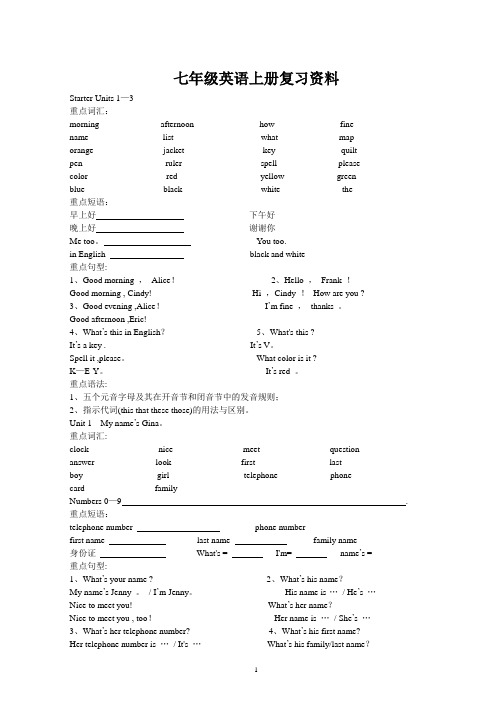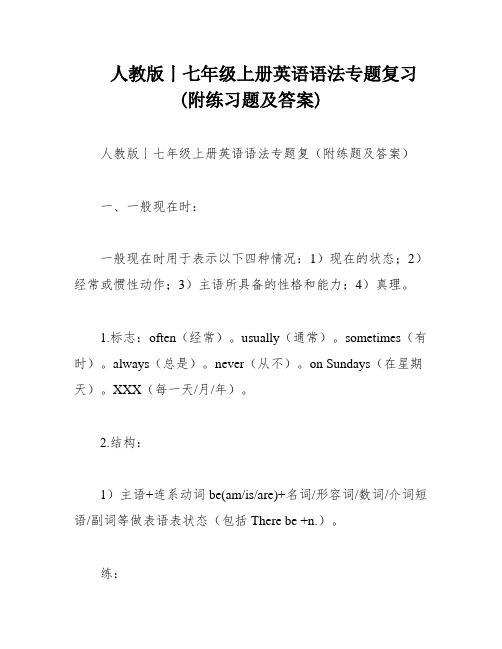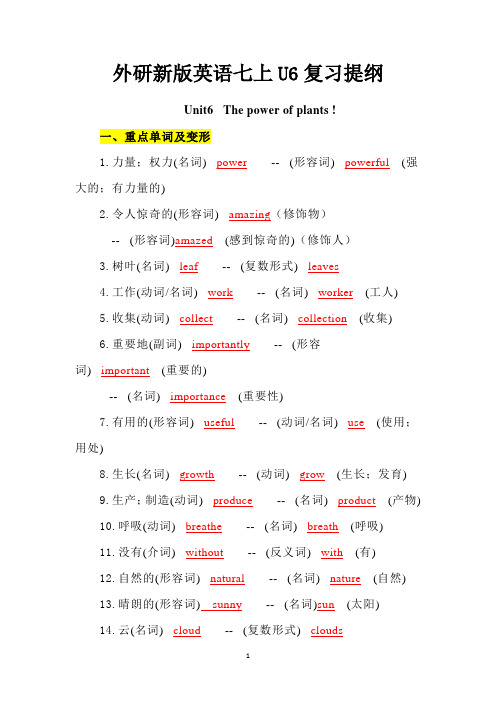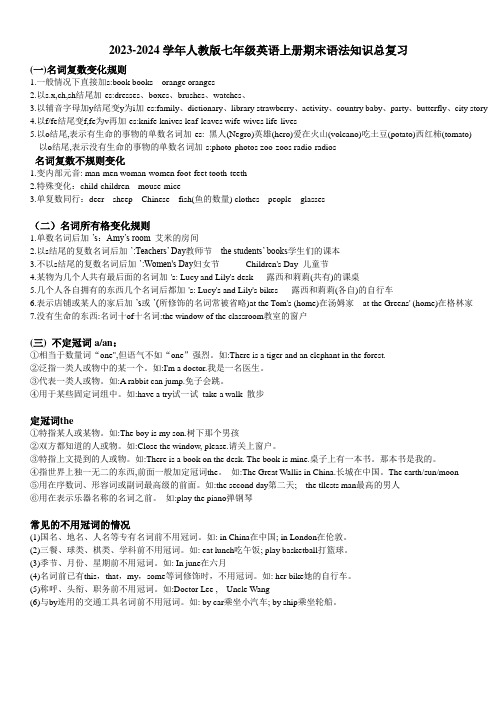七年级上册英语复习资料
人教版七年级上册英语期末复习资料(1)

七年级英语上册复习资料Starter Units 1—3重点词汇:morning afternoon how finename list what maporange jacket key quiltpen ruler spell pleasecolor red yellow greenblue black white the重点短语:早上好下午好晚上好谢谢你Me too。
You too.in English black and white重点句型:1、Good morning ,Alice!2、Hello ,Frank !Good morning , Cindy! Hi ,Cindy !How are you ?3、Good evening ,Alice!I’m fine ,thanks 。
Good afternoon ,Eric!4、What’s this in English?5、What's this ?It’s a key . It’s V。
Spell it ,please。
What color is it ?K—E-Y。
It’s red 。
重点语法:1、五个元音字母及其在开音节和闭音节中的发音规则;2、指示代词(this that these those)的用法与区别。
Unit 1 My name’s Gina。
重点词汇:clock nice meet questionanswer look first lastboy girl telephone phonecard familyNumbers 0—9 . 重点短语:telephone number phone numberfirst name last name family name身份证What's = I'm= name’s =重点句型:1、What’s your name ?2、What’s his name?My name’s Jenny 。
2024-2025学年人教版七年级英语上册+Starter+Units+1~3单元总复习课件+

Miss Green 格林小姐 Mrs.Brown 布朗夫人
【详解 3】it 指代词,指代前面所提到的东西或人。 【误区警示】its 易与 it’s 混淆。 its It’s 是 It is 的缩略式,意思是“它是”,用时要注意以下: 1、在句首时 It’s 和 It is 两者可以通用。 例如: It’s(It is) a pen.
【详解 2】 good adj. (反义词:bad) (1)好的;令人愉快的 A good book 一本好书 have a good time 玩得愉快 (2)有益的,有效的,适宜的 Milk is good for you.
【搭配】be good at 擅长 be good for 对……有好处/有用 be good to 对…… 好/和善 【典例】 Eating vegetables is __B___ for us. A.better B. good C. well
凌晨至中午 12:00 前
12:00 之后的整个下 午 黄昏到入睡之前
【注意】 Good night!并不是问候语,而是晚上分别时或 就寝前的道别用语,它的含义是“晚安”“再见” ,答语仍为“Good night!”。
【练习】—Good night, Mom!
—___C________.
A. Good morning B. Good afternoon C. Good night
(2)有时出于礼貌还要反问对方: How are you?或 And you?
【辨析】How are you?与 How do you do?
区别 2 How are you?
七年级英语上册知识点归纳

七年级英语上册知识点归纳期末考试就要到来了,要复习的英语知识点有哪些呢?接下来是店铺为大家带来的关于七年级英语上册知识点归纳,希望会给大家带来帮助。
七年级英语上册知识点归纳(一)1、Good morning/ afternoon / evening早上/下午/晚上好Good night 晚安(晚上告别)2、glad / nice to meet / see you 见到你很高兴(回答也一样)3、welcome to + 地点欢迎来到…… (回答:Thank you 或者Thanks)4、let’s + V(原) 让我们做……5、 stand up 起立sit down 坐下6、 this is ... -这是…… (用于介绍第三者的用语)7、 How do you do ?你好 (回答也是:How do you do ? )8、 How are you ? 你好吗? Fine, thank you, and you?很好;谢谢;你呢?I’m OK / I’m fine, too. 我也很好。
9、see you = see you later = see you soon =good-bye 再见10、excuse me打扰一下;请问11、I’m … = my name is …我是……12、be from = come from 来自13、in English 用英语14、Can you spell it ? Yes /No 你能拼写它吗? 能/不能15、That’s OK /That’s all right / You’rewelcome / Not at all不用谢16、…… years old ……岁17、ewtelephone number 电话号码QQnumber QQ号码ID number 身份证18、the same (相同的) 反义词是 different (不同的)例: We are in the same grade, but we are indifferent classes.句型:1. What is yourname?你的名字是什么?2. Where +be + 主语 + from? 或者Where +助动词(do/does)+主语+come from?某人来自于哪里?(回答:主语+be+地点)Where are you from? =Where do you come from?回答:I am from Zhaoqing. =I come from Zhaoqing.3. How old + be + 主语?某人几岁? (回答:主语 + be + 数字 )例:How old are you? I’m fourteen (years old).4. What is your telephonenumber? 你的电话号码是多少?(回答:My telephone number is ... 或者It’s ... )注意:读出号码的时候要逐个读出。
人教版丨七年级上册英语语法专题复习(附练习题及答案)

人教版丨七年级上册英语语法专题复习(附练习题及答案)人教版丨七年级上册英语语法专题复(附练题及答案)一、一般现在时:一般现在时用于表示以下四种情况:1)现在的状态;2)经常或惯性动作;3)主语所具备的性格和能力;4)真理。
1.标志:often(经常)。
usually(通常)。
sometimes(有时)。
always(总是)。
never(从不)。
on Sundays(在星期天)。
XXX(每一天/月/年)。
2.结构:1)主语+连系动词be(am/is/are)+名词/形容词/数词/介词短语/副词等做表语表状态(包括There be +n.)。
练:1.I am a student。
My name is Tom.2.Where are my shoes。
They are here.3.Who is the girl with long straight hair。
I think she is Kate.4.You and I are not in Class Six.5.XXX。
Yes。
there is.6.XXX。
No。
they aren't.2)主语(非第三人称单数)+行为动词原形+其他(用助动词do帮助构成否定句、一般疑问句和特殊疑问)。
3)主语(第三人称单数)+行为动词的第三人称单数+其他(用助动词does帮助构成否定句、一般疑问句和特殊疑问句)。
行为动词第三人称单数加-s的形式:1.-s2.辅音+y: study-studies3.以s,x,ch,sh结尾: watch-watches。
XXX4.特殊: have-has。
do-does。
go-goes。
练:1.His parents watch TV every night.肯定句:1.XXX.否定句:2.His parents do not watch TV every night.n: My brother does not do homework every day。
七年级上册英语期末复习资料

七年级上册英语期末复习资料七年级上册英语期末复习资料七年级上册英语期末复习资料11.常用日常用语:――Goodmorning.――Goodmorning.早晨/上午好,――Goodafternoon.—Goodafternoon.下午好,――Goodevening.—Goodevening.晚上好,――Goodnight.――Goodnight.晚安。
2.――Howareyou?――你好吗?――I'mfine/OK/well/allright.Thankyou――我很好,谢谢。
疑问词how在此处用于对身体健康状况提问。
回答常用fine、OK、well、allright等。
eg.――areyourparents?――Theyarefine.A.HowB.WhereC.WhatD.Who3.――What'sthisinEnglish?这在英语中是什么?――It'sanorange.桔子。
疑问词what“什么东西”,用于对物体提问。
in放在语言之前,表示用某种语言。
eg.inEnglish“用英语”、inChinese“用汉语/中文”。
4.冠词a和an的用法区别。
a和an都可表示“一个(件、支、把……)”的意思。
但a只能用于辅音(音标)之前,表示一的概念;an只能用于元音(音标)之前,表示一的概念。
eg.astudent一个学生、aruler一把尺子、anEnglishbook一本英语书、anorange一个橙子。
5.Spellit,please.请拼写它。
Howdoyouspellit?你怎样拼写它?Canyouspellit?你能拼写它吗?Spellit,please.和Howdoyouspellit?要直接拼写单词;Canyouspellit?则是一个一般疑问句,要先回答yes,再拼写。
eg.――Spellit,please.请拼写它。
/Howdoyouspellit?你怎样拼写它?――R-U-L-E-R.――Canyouspellit?你能拼写它吗?――Yes,Ican.R-U-L-E-R.6.—Whatcoloristhekey?――It'sy ellow.—这把钥匙什么颜色?—黄色。
2024外研版英语七年级上册

外研新版英语七上U6复习提纲Unit6 The power of plants !一、重点单词及变形1.力量;权力(名词) power-- (形容词) powerful(强大的;有力量的)2.令人惊奇的(形容词) amazing(修饰物)-- (形容词)amazed(感到惊奇的)(修饰人)3.树叶(名词) leaf-- (复数形式) leaves4.工作(动词/名词) work-- (名词) worker(工人)5.收集(动词) collect-- (名词) collection(收集)6.重要地(副词) importantly-- (形容词) important(重要的)-- (名词) importance(重要性)7.有用的(形容词) useful-- (动词/名词) use(使用;用处)8.生长(名词) growth-- (动词) grow(生长;发育)9.生产;制造(动词) produce-- (名词) product(产物)10.呼吸(动词) breathe-- (名词) breath(呼吸)11.没有(介词) without-- (反义词) with(有)12.自然的(形容词) natural-- (名词) nature(自然)13.晴朗的(形容词)sunny-- (名词)sun(太阳)14.云(名词) cloud-- (复数形式) clouds-- (形容词) cloudy(多云的)15.面条(名词) noodle-- (复数形式) noodles16.大的(形容词) big-- (比较级) bigger(更大的)-- (最高级) biggest(最大的)17.餐;盘子;菜肴(名词) dish-- (复数形式) dishes18.健康(名词) health-- (形容词) healthy(健康的) -- (副词) healthily(健康地)19.文化(名词) culture-- (复数形式) cultures20.喝(动词);饮品(名词) drink -- (过去式) drank21.制作(动词) make-- (过去式) made二、重点短语1.植物的力量the power of plants2.神奇的植物世界the amazing world of plants3.植物内部within a plant4.二氧化碳carbon dioxide5.七点半quarter past seven6.穿着他的绿色制服in his green uniform7.搜集阳光和二氧化碳collect sunlight and CO28.在白天during the day9.上升到... rise up to ...10.通过茎through the Stem11.最重要的是most importantly12.对...有用be useful for ...13.植物的生长the growth of the plant14.另一个产物another product15.对...来说很重要mean a lot to ...16.努力工作work hard17.变黑get dark18.休息一下take a rest19.数百万的... millions of ...20.地球上on earth21.超过;多余more than22.没有植物without plants23.自然世界the natural world24.如何产糖how to make sugar25.用其他的方法in other ways26.转变成... turn into ...27.太阳花的种子sunflower seed28.长成... grow into ...29.植物的不同部分different parts of plants30.变成... change into ...31.不同的颜色different colours32.在秋天in autumn33.欢迎来到welcome to ...34.穿过森林walk through the forest35.带雨衣take a raincoat36.某人自己的... one’s own ...37.抬头look up38.在...顶端at the top of ...39.形成云become clouds40.使...幸福make ... happy41.活数千年live for thousands of years42.住的地方somewhere to live43.吃的食物food to eat44.种树plant trees45.植树节Planting Day46.全世界around the world47.用不同的方法in different ways48.例如for example/ such as49.米粉rice noodles50.东亚the East Asia51....的重要性the importance of ...52....厘米长... centimetres long53.种玉米grow corn54....年以前... years ago55.玉米美食corn dishes56.玉米须corn silk57.玉米壳corn husks58.被用来做... be used to do sth.59.对...有好处be good for ...60.试着做某事try to do sth.61.寻求ask for ...62.当然of course63.共同点in common64.最受欢迎的饮品the most popular drink65.不但...而且... not only ... but also ...66....关键的一部分 a key part of ...67.像...一样多as many ... as ...68.一杯茶 a cup of tea69.过去常常做某事used to do sth.70.带某人去某地take sb. to地点71.喝茶drink tea72.出国留学study abroad73.大多数most of ...74.更喜欢做某事prefer to do sth.75.绿茶green tea76.红茶black tea77.感觉像feel like ...78.回家be back home79.下午茶afternoon tea80.整天all day81.放学后after school82.回来come back83.不是个秘密It’s no secret84.由...制成be made from ...(看不出原材料)85.由...制成be made of ... (看得出原材料)三、重点句型1.我们周围到处都有植物。
人教版部编版七年级英语上册知识点汇总

人教版七年级英语(上册)辅导材料第一块国际音标国际音标是一种工具,其作用是标记英语字母和单词的读音。
1、20个元音单元音:/i:/ Ee1、/з:/her /u:/ do/I/ it /?/about /u/ book/ɑ:/ are // or /?/ any// us // off /e/ at双元音:// Ii // out // ear// Aa,// Oo // air// boy // sure2、28辅音:成对的清浊辅音:/p/map /t/ it /k/book /f/off /θ/math /s/yes/b/club /d/dad /g/big /v/have /e/this /z/zoo// fish // watch /tr/ tree /ts/ its // usually // orange /dr/ dress /dz/ beds 其他辅音:/m/ am /n/ and // English /l/ like/h/ hello /r/ red /w/ what /j/ yes3、国际音标拼读规则:辅见元,碰一碰。
/l/在前,发本音;音节后面卷下舌。
/p/、/t/、/k/、/tr /清辅音,/s/后读成浊辅音。
本块词汇:speak说讲start开始school学校 s trict严格的out外面club俱乐部usually通常 dress化妆about关于大约us我们her她的ear耳朵English英语sure当然可以air空气or或者any一些boy男孩orange橙子,桔子map地图tree树math数学 off离开watch观看手表do做like喜欢 beds床what什么hello喂是的red红色的yes是的 book书its它的 zoo动物园fish鱼dad爸爸big大的have有this这it它第二块三个预备单元一、文化常识1、英语文化区域,熟人之间见面,常要互相问好。
2023-2024学年人教版七年级英语上册期末语法知识总复习

2023-2024学年人教版七年级英语上册期末语法知识总复习(一)名词复数变化规则1.一般情况下直接加s:book books orange oranges2.以s.x,ch,sh结尾加-es:dresses、boxes、brushes、watches、3.以辅音字母加y结尾变y为i加-es:family、dictionary、library strawberry、activity、country baby、party、butterfly、city story4.以f/fe结尾变f,fe为v再加-es:knife-knives leaf-leaves wife-wives life-lives5.以o结尾,表示有生命的事物的单数名词加-es: 黑人(Negro)英雄(hero)爱在火山(volcano)吃土豆(potato)西红柿(tomato)以o结尾,表示没有生命的事物的单数名词加-s:photo-photos zoo-zoos radio-radios名词复数不规则变化1.变内部元音: man-men woman-women foot-feet tooth-teeth2.特殊变化:child-children mouse-mice3.单复数同行:deer sheep Chinese fish(鱼的数量) clothes people glasses(二)名词所有格变化规则1.单数名词后加-’s:Amy’s room 艾米的房间2.以s结尾的复数名词后加-’:Teachers’ Day教师节the students’ books学生们的课本3.不以s结尾的复数名词后加-’:Women's Day妇女节Children's Day 儿童节4.某物为几个人共有最后面的名词加-'s: Lucy and Lily's desk 露西和莉莉(共有)的课桌5.几个人各自拥有的东西几个名词后都加-'s: Lucy's and Lily's bikes 露西和莉莉(各自)的自行车6.表示店铺或某人的家后加-’s或-’(所修饰的名词常被省略)at the Tom's (home)在汤姆家at the Greens' (home)在格林家7.没有生命的东西:名词十of十名词:the window of the classroom教室的窗户(三) 不定冠词a/an:①相当于数量词“one",但语气不如“one”强烈。
- 1、下载文档前请自行甄别文档内容的完整性,平台不提供额外的编辑、内容补充、找答案等附加服务。
- 2、"仅部分预览"的文档,不可在线预览部分如存在完整性等问题,可反馈申请退款(可完整预览的文档不适用该条件!)。
- 3、如文档侵犯您的权益,请联系客服反馈,我们会尽快为您处理(人工客服工作时间:9:00-18:30)。
一、单词1. in the same class 在同一班2. study … with…与…一起学习…3. No problem 没问题4. by the way 顺便问一下5. speak Chinese 讲汉语6. only a little 只有一点点7. Of course =Sure 当然8. help\study each other 互相帮助/学习9. live in …居住在…10. the same age as …与…同岁11. want to do sth. 想要做某事12. come to China 来到中国13. in English 用英语14. help sb. with sth. 帮助某人做某事15. the Great Wall 长城16. at the English corner 在英语角17. be helpful to…对…有帮助二、句型:1. May I do sth.? 我可以做某事吗?e.g. : May I know\have\ask your name? May I study English with you?May I call you Mike?2. like … very much \ a lot 非常喜欢……like … a little 有点喜欢…not like … at all 根本不喜欢……not like … very much 不是很喜欢……三、语法:(一) 一般现在时1.肯定句: We speak Chinese否定句: We don’t speak Chinese.一般疑问句: Do you speak Chinese?回答: Yes, we do. No, we don’t.2.肯定句: Mike speaks English.否定句: Mike doesn’t speak English.一般疑问句: Does Mike speak English?回答: Yes, he does. No, he doesn’t.3.动词第三人称单数构成形式:见书本107页(二)代词人称代词:数/格人称单数复数主格宾格主格宾格第一人称 I me we us第二人称 you you you you第三人称 he himtheythemshe herit it主格:在句中当句子主语e.g. I have a good friend.He has a good friend.宾格: 在句中当动词的宾语或介词的宾语,形成动宾或介宾结构.Please call me Mike. (动宾)Give it (动宾) to me (介宾) .Help us find him. (动宾)人称代词排列顺序:(可记住口诀)you, he and I; we, you and they; he and she口诀:对你尊重you在前,谦虚礼貌I最后;我们人多力量大,we要排在you之前,they委屈垫在后;两性并列不平等,绅士风度放一边,he 在前she在后。
特殊情况:1. 为了强调某人称,或是出现在承认错误之类的句中时,应把第一人称的I,放在前。
2. 当说话人I的身份很高或回忆往事时,可以先说I。
物主代词:性数/人称形容词性物主代词名词性物主代词单数第一人称 my mine第二人称 your yours第三人称 his hisher hersits its复数第一人称 our ours第二人称 your yours第三人称 their theirs形容词性物主代词,也称非独立性物主代词,不能单独使用,必须与名词共同使用.e.g. my nameyour motherhis friendtheir teacherTopic2 Come and meet my family一、单词1.职业名称teach (教) --------- teacher (教师)study (学习) --------- student (学生)work (工作) --------- worker (工人)drive (驾驶) --------- driver (驾驶员)farm (农场) --------- farmer (农夫)cook (烹调) --------- cook (厨师)1. 对应词:teacher --------- studentnurse --------- doctor2. office worker公务员policeman警察waiter男服务员 --------- waitress女服务员salesman 男售货员 --------- salesgirl女售货员3. 家庭成员grandfather --------- grandmothergrandpa --------- grandmafather --------- motherDad --------- MumUncle --------- auntson --------- daughterbrother --------- sistercousin二、词组1.工作场所:in a school 在学校in a hospital 在医院in an office 在办公室in a shop / store 在商店on a farm 在农场2. a student of Grade Seven 一名七年级的学生have a job 有一份工作look after…照顾……; 保管……a photo of my family 一张我家的相片have a look 看一看the young woman in yellow 穿黄衣服的年轻女士on the sofa 在沙发上三、句型:1. I’m home. 我回来了.2. Come in and make yourselves at home. 请进, 请别客气.3. What a nice place! 多漂亮的一个地方!4. Please have a seat= Please sit down. 请坐!5. My parents are both office workers. 我父母二个都是公务员. We all love our work. 我们都喜爱我们的工作.注意:both指两者"都"; all指三者或三者以上"都"四、语法:(一) 提问职业:1.What do you do? I am a doctor.2.What does he \she do? He \She is a doctor.(二) 提问工作场所:1. Where do you work?I work in a hospital\school2.Where does he \she work ?He\She works in an office\on a farm.(三) 名词所有格: s’或’s, 表示"……的"Kangkang’s grandfather康康的祖父母Jane’s family tree 珍妮的家谱Teachers’ book 教师用书(教师们的书)Topic3 Would you like to eat?一、词汇:Fruit: (可数) apple orangeFood: (可数) cake hamburger egg French fries dumpling noodles(不可数) rice porridge bread meat chicken fish beefDrink: (不可数) tea milk Coke coffee water juiceEat (吃) + drink (喝) = havesomething to drink 喝的东西something to eat 吃的东西have dinner 吃饭;吃正餐have breakfast 吃早饭have lunch 吃午饭have supper 吃晚饭二、句型;1. help oneself (to sth) 请自便 (吃些某物)2. would like = want 想要Would you like some eggs? = Do you want some eggs?What would you like to drink? = What do you like to drink?3. Give me some meat. = Give some meat to me.4. Why not have some milk? 表示提建议5. Let’s have some milk. 表示提建议6. May I take your order? = May I help you?(限于用餐)7. Wait a moment, please.请稍等片刻.8. What do you think of the coffee? = How do you like the coffee? 你觉得咖啡怎么样?9. Would you like to have dinner with me? (表邀请)Ok. I’d love to10. I’m very glad to be here.我非常乐意呆在这儿11. Any more rice? 再来些米饭怎么样?12. They are all friendly \kind to me.他们都对我很友好。
三、语法: 可数名词和不可数名词的量(一)可数名词: 可直接用基数词表具体的量表"一":a cake \book \hamburger\bike an apple \orange \eggtwo cakes three books four apples five eggs(二)不可数名词:可用数量词来表示具体的量a cup of tea \coffeetwo cups of tea \coffeea glass of milk\water\juicethree glasses of milk\water \juicea bowl of …一碗…… two bowls of …两碗……a box of …一盒\箱…… two boxes of …两盒\箱……a bag of …一袋…… two bags of …两袋……a bottle of …一瓶…… two bottles of …两瓶……a kilo of …一公斤…… two kilos of …两公斤……a kind of …两种…… two kinds of…两种……a plate of …一盘…… two plates of…两盘……a basket of eggs …一篮/筐鸡蛋…… two baskets of eggs…两篮鸡蛋……a pair of …一双/副/对…… two pairs of…两双/副/对……(三) 模糊的量some既可以修饰可数也可以修饰不可数名词a few + 可数表示若干\一点a little + 不可数表示若干\一点many + 可数许多much + 不可数许多some apples 一些苹果some meat\water 一些肉\水a few friends 几个朋友a little water 一点点水many friends 许多朋友much water 许多水Unit 4 Having FunTopic 1 Can I help you?词汇:1. 数词:21-101 注意:A. forty; eighty; B. 读音: ~teen 与 ~ty2. 名词:可数名词与不可数名词的划分3. 词形变换:also (同义词) too each (同义词) everykilo (复数) kilos watch (复数) watchesmouse (复数) mice expensive (同义词) dearwaiter (对应词) waitress try (第三人称单数) triessell (反义词) buy4. 词语与短语:on the fourth floor 在第四层楼try on 试穿be on sale 减价(出售)another pair of pants 另一条裤子two yuan a kilo 每公斤两元sell / buy… for…以…价出售/ 购买have a look 看一看a clothing shop 一家服装店run over to…跑到…two bags of salt 两包盐two kilos of eggs 两公斤鸡蛋six bottles of milk 六瓶牛奶Thanks anyway 仍然感谢。
